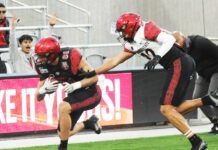The Captain, Chula Vista’s Norbert Stein, needs no introduction on these pages. He was recently formally acknowledged as the San Diego Sockers’ all-time No. 1 fan by his beloved club, and also is believed to be its oldest fan at 98.
Stein was among those individuals fortunate enough to leave Nazi Germany before places like Auschwitz officially opened for business. He arrived in the care of relatives already on this side of the Atlantic in 1935. He found work that same day in New York City.
Stein grew up in Aidhausen in Bavaria, already having lived through three regime changes. The third one didn’t suit him.
Things are different in Europe, and Stein received an unpaid apprenticeship at age 14 in the meat-cutting business. He continued that profession in the United States, literally living the American Dream.
He remembers his mother calling out to him not to be late for the bus while leaving Germany.
Stein took the bus to Schweinfuhrt, then a train to Bremen. The voyage aboard the Europa took eight days across the Atlantic. As he arrived in New York harbor, he glimpsed the Statue of Liberty as his ship sailed to dock at the 10th Avenue Pier.
It proved to be a fortuitous sighting.
Stein worked his first day in America and never was out of a job after that.
“The 27 of June 1935, I took a piece of meat to a customer’s car,” Stein recalled. “He gave me a nickel tip and I worked in his butcher shop on Saturday for $1 salary.
“Fifteen dollars a week was a lot of money back then,” he said. “For a nickel you could ride the subway or buy a cup of coffee. Those were the good old days.”
Stein spent some time in Cuba during the late 1930s working the wholesale meat market for his employers in the states.
“We bought boneless meat for eight cents a pound — you could buy live cattle for 2 cents on the hoof — and sold it for 20 cents a pound in New York,” he said.
Pre-communist Cuba was a paradise in many respects, he said. He learned Spanish to communicate in the workplace and is a very good speaker today out of the workplace.
Stein fought for his adopted country in the Second World War, serving in the Pacific theater. He has many stories, most of how he narrowly escaped death.
He remembers coming under attack from Japanese machine-gunners at one point and taking cover behind a mound of earth while other drove into fox-holes. He heard a fellow soldier moan and crawled over to him to find him shot between the eyes, his brains coming out.
“I left him there,” Stein said. “There was nothing I could do.”
On another occasion, he came upon several Japanese soldiers holed up in a cave. He fired his weapon and challenged them to come out and surrender. A voice came out of the darkness: “American citizen no cut off head?”
Stein reached for his Japanese phrase book and replied, “American no cut off head, come out, we don’t shoot.”
Shortly thereafter, three Japanese soldiers came out of the cave and handed over their grenades.
“I took a big chance because they usually blew themselves up,” Stein said.
The three enemy soldiers were presented for interrogation at company headquarters of the 77th Infantry Division.
“There were tunnels everywhere,” said Stein, who received a Bronze Star for his heroism.
“I could have been killed 50 different times,” he said.
After the war, Stein returned to New York City. He bought his first new car in Manhattan for $1,150 — a large Pontiac. He drove for 73 years before recently surrendering his license due to macular degeneration.
Stein moved to Chula Vista in 1958 to, in his words, “give California a try.” He bought a butcher shop at Third and G Street for $1,200 and, after $2,000 in renovations, opened it near the Seville Market: hence, the name “Butcher of Seville.”
Stein operated his butcher shop from 1962 to 1972, selling custom-cut steaks and meats. Three pounds of hamburger went for $1 in those days. Many of his clients were restaurants and hospitals.
He purchased fresh meat from a slaughterhouse in National City. “I had the best meat in town — I cut steaks to order,” he said.
Stein also honed his words for ad-lib poetry, for which he might be better well known as the self-proclaimed “Poet of Chula Vista.”
It was during this time that he developed several friendships with customers, including KFMB-TV personality Bob Dale, who brought Stein onto his daytime talk show for cameo appearances.
Remember the guy holding the loaf of Towntalk bread? Well, he was the talk of the town while doing the commercial promo.
He also demonstrated how to cut meat on the show.
When big business began to force out smaller operations, Stein sold his butcher shop for $6,000.
Fortunately, he had something to fall back on. Long-term investments enabled him to enter the real estate market when housing prices were low.
Today, he now owns about a dozen properties, about half in Chula Vista. In effect, a long life has given him his own little empire. But a tyrant he is not.
Stein arrived in America amid the Great Depression, seeking the help of others to build a better life for himself. Eighty years later — more than a human life span for many of us — our nation once again finds itself in the throes of financial peril. This time, Stein finds himself at the other end of the spectrum. Now he is in a position to help others in need.
“The message is that you want to help people,” he said.
Renting is not as lucrative as it may sound, especially when dealing with older properties that can be costly to maintain.
About a third of renters have a problem paying rent on time, Stein said. As a property owner, he suggested fellow landlords should work with any tenants experiencing financial problems in the current economy rather than seek harsh penalties.
“Help your neighbor is my motto,” Stein said.
Recently, one of Stein’s renters in Chula Vista lost his job and became partially disabled. He decided to do something quite noble in these tough times. He reduced the family’s rent (from $1,275 per month for a four bedroom house to $1,000, payable in two $500 installments) and went a step further, leaving the house to the family in his living trust.
“It’s paid for,” he said. “And I can’t take it with me.”
The deal obviously brought tears at both ends — and a poem from the renters.
Stein was obviously humbled, which isn’t an easy thing to do.
The poem reads:
“There’s a man in Chula Vista, his name, Norbert Stein
He goes around doing good all of the time.
He said one day “I can be a better man,
We honestly don’t know how he possibly can.
He’s full of compassion and grace,
Always wearing a smile upon his face.
When people meet him, they think he’s neat,
Enjoying his stories, how he used to cut meat.
He’s been a poet now for several years,
His poems bring smiles and drive away tears.
Knowing him is a joyous treat,
He has a heart of gold and is very sweet.
Those that know him, swear he’s a saint,
On the day of March 8, he turns ninety-eight.
A greater person you’ll be hard pressed to find,
Than his man, our friend, his name, Norbert Stein.”











